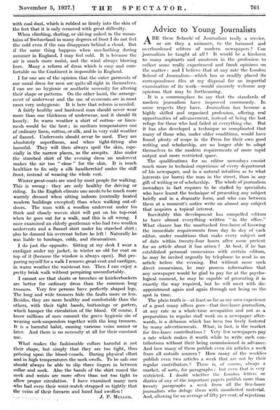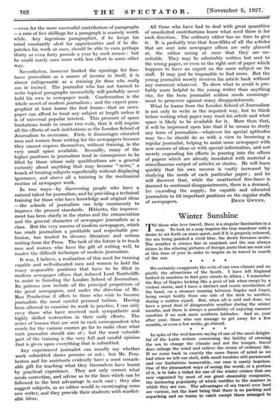Advice to Young Journalists
ARE these Schools' of Journalism really a service, or are they a nuisance, to the harassed and overburdened' editors of modern newspapers ? Can journalism be taught at all ? It would be a kindness to many aspirants and amateurs in the profession to collect some really experienced and frank opinions on the matter : and I believe that at any rate the London School of Journalism—which has so readily placed its correspondence files at my disposal for an impartial examination of its work—would sincerely welcome any opinions that may be forthcoming.
It is a commonplace to say that the standards of modern journalism have improved enormously. In some respects they have. Journalism has become a highly skilled and organized profession, offering real opportunities of advancement, instead of being the last refuge for those who had failed at everything else. But it has also developed a technique so complicated that many of those who, under older conditions, would have found plenty of scope in the Press for their own good writing and scholarship, are no longer able to adapt themselves to the modern requirements of more rapid output and more restricted space.
The qualifications for an editor nowadays consist much more in technical experience of every department of his newspaper, and in a natural intuition as to what interests (or bores) the man in the street, than in any gift of writing or of scholarship. The whole of journalism nowadays in fact requires to be staffed by specialists who have learnt the technique of presenting any subject briefly and in a dramatic form, and who can between them at a moment's notice write on almost any subject that acquires a topical interest.
Inevitably this development has compelled editors to have almost everything written " in the office." What chance has the unattached free-lance of knowing the immediate requirements from day to day of each editor, under conditions that make every subject out of date within twenty-four hours after some pretext for an article about it has arisen ? At best, if he has established personal connexions with certain editors, he may be invited urgently by telephone to send in an article before the evening. But without some such direct connexions, he may possess information that any newspaper would be glad to pay for at the psycho- logical moment, he may be capable of presenting it in exactly the way required, but he will meet with dis- appointment again and again through not being on the spot in time.
The plain truth is—at least so far as my own experience of a good many offices goes—that free-lance journalism, at any rate as a whole-time occupation and not as a preparation to regular staff work on a newspaper after- wards, is a delusion which has been too freely fostered by many advertisements. What, in fact, is the market for free-lance contributions ? Very few newspapers pay a rate which makes it worth while to write such con- tributions without their being commissioned in advance. And how many of them publish even six articles a week from all outside sources ? How many of the weeklies publish even two articles a week that arc not by their regular contributors ? There is, of course, always a market, of sorts, for paragraphs ; but even that is very restricted. I doubt whether the London letters or diaries of any of the important papers publish more than twenty paragraphs a week from all the free-lance journalists who deluge them with unsolicited material. And, allowing for an average of fifty per cent. of rejections —even for the more successful contributors of paragraphs —a rate of five shillings for a paragraph is scarcely worth while. Any ingenicius paragraphist, if he keeps his mind constantly alert for opportunities and if he dis- patches his work at once, should be able to earn perhaps thirty or even forty pounds a year by such means : but he could surely earn more with less effort in some other way.
Nevertheless, however limited the openings for free- lance journalism as a source of income in itself, it is almost indispensable as a training for those who really can be trained. The journalist who has not learned to write topical paragraphs successfully will probably never hold his own in newspaper work. Condensation is the whole secret of modern journalism ; and the expert para- graphist at least learns the first lesson—that no news- paper can afford to treat any subject at length unless it is of universal popular interest. This pressure of space limitations tends to create two evils, that it will require all the efforts of such institutions as the London School of Journalism to overcome. First, it discourages educated men and women from writing for the newspapers because they cannot express themselves, without training, in the very small space available. Secondly, many of the higher positions in journalism tend in consequence to be filled by those whose only qualifications are a general curiosity about anything that may become " news," a knack of treating subjects superficially without displaying ignorance, and above all a training in the mechanical routine of newspaper work.
In two ways—by discovering people who have a natural talent for journalism, and by providing a technical training for those who have knowledge and original ideas —the schools of journalism can help enormously to improve the present standards. Hitherto, the improve- ment hag been chiefly in the status and the remuneration and the general character of newspaper journalists as a class. But the very success of modern newspapers, which has made journalism a profitable and respectable pro- fession, has tended to divorce literature and serious writing from the Press. The task of the future is to teach men and women who have the gift of writing well, to master the difficult technique of modern journalism.
It was, I believe, a realization of this need for training capable and well-educated men and women to hold the many responsible positions that have to be filled in modern newspaper offices that induced Lord Northcliffe to assist in founding the London School of Journalism. Its patrons now inchide all the principal proprietors of the great newspapers, and under the direction of Mr: Max Pemberton it offers to those who wish to become journalists the most careful personal tuition. Having been allowed to examine its work in practice, I can only envy those who have received such sympathetic and highly skilled instruction in their early efforts. The series of lessons that are sent to each correspondent who enrols for the various courses go far to make clear what each journalist should aim at ; but the most valuable part of the training is the very full and candid opinion that is given upon everything that is submitted.
Any experienced journalist can usually say whether work submitted shows promise or not ; but Mr. Pem- berton and his assistants evidently have a most remark- able gift for teaching what they themselves have learnt- by practical experience. They not only correct what needs correction, and advise as to the lines which can be followed to the best advantage in each case ; they also suggest subjects, as an editor would in encouraging some- new writer, and they provide their students with market- able ideas. All those who have had to deal with great quantities of unsolicited contributions know what need there is for such direction. The ordinary editor has no time to give it. It is probably true that four-fifths of all the articles that are sent into newspaper offices are only glanced at, the editor seeing at once that they are un- suitable. They may be admirably written but sent to the wrong paper, or even to the right sort of paper which happens to have an expert on the same subject on its staff. It may just be impossible to find room. But the young journalist merely receives his article back without any comment whatever. To show what to avoid is pro- bably more helpful to the young writer than anything else, for the born journalist seldom needs encourage- ment to persevere against many disappointments.
What he learns from the London School of Journalism is not only to write in the required way, but to think before writing what paper may want his article and what space is likely to be available for it. More than that, it will be impressed upon him that if he means to study any form of journalism—whatever his special aptitudes may be—he should do so with a view to becoming a regular journalist, helping to assist some newspaper with new sources of ideas or with special information, and not merely expending his efforts in pouring into the offices of papers which are already inundated with material a miscellaneous output of articles or stories. He will learn quickly that his own success is vastly increased by studying the needs of each particular paper ; and he will discover that, while the unattached free-lance is doomed to continual disappointments, there is a demand, far exceeding the supply, for capable and educated journalists to fill important positions on the regular staffs



















































 Previous page
Previous page